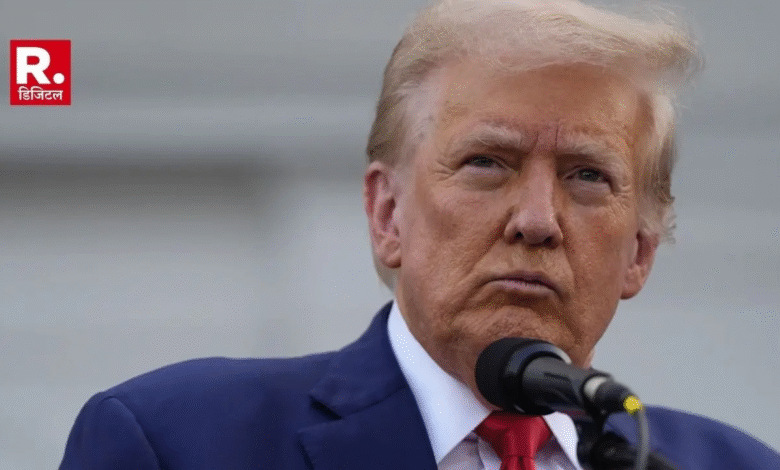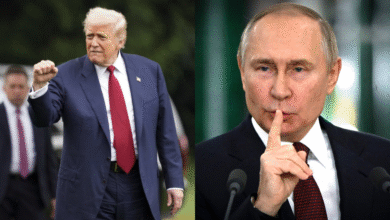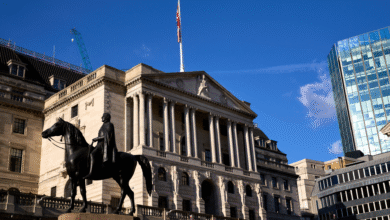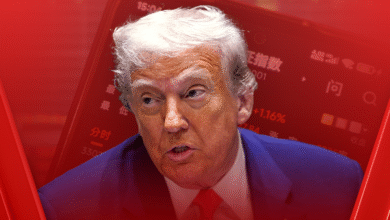Trump Tariffs and Inflation: Fed Contenders Weigh In

In recent discussions about Trump’s tariffs and inflation, two notable economists seeking positions on the Federal Reserve, Stephen Miran and James Bullard, have voiced their skepticism regarding the link between tariffs and rising prices. Contrary to the fear held by some that these tariffs would precipitate inflation, both experts assert that there is no substantial evidence to support that claim. Their arguments align with a broader economic policy discussion that favors interest rate cuts as a means of stimulating growth without succumbing to inflationary pressures. This revelation comes at a critical time, as inflation rates have been hovering slightly above the Federal Reserve’s target, yet Miran and Bullard maintain that tariff-induced price increases are unfounded. As the Federal Reserve navigates these complex economic waters, the debate on tariffs will undoubtedly continue to be a focal point, influencing policy decisions and economic sentiment going forward.
When examining the relationship between trade barriers and price levels, particularly in the context of President Trump’s trade policies, it is essential to consider the statements made by prominent economists Stephen Miran and James Bullard. They challenge prevalent concerns surrounding the implications of import tariffs on inflation rates, suggesting that such price hikes are not as imminent as some experts might argue. This dialogue is crucial within the spectrum of fiscal strategy, especially as the Federal Reserve evaluates its approach to interest rate adjustments amid evolving economic conditions. With inflation currently standing just above the desired targets, these discussions take on added significance as policymakers look for effective solutions. As such, the debate surrounding tariffs and their economic impact remains central to the ongoing discourse in economic circles.
The Discourse on Tariffs and Inflation
The claim that Trump’s tariffs are causing inflation has been a point of contention among economists. Stephen Miran and James Bullard, both contenders for positions at the Federal Reserve, have publicly opposed this narrative. They argue that the evidence supporting the rise in prices due to tariffs is insufficient and that the tariffs themselves might not have the detrimental impact on inflation that has been widely suggested. Their remarks come at a time when inflation levels, according to consumer prices, have been hovering just over the Federal Reserve’s target, adding complexity to the economic policy debate.
This dissenting view reflects a broader discussion about how tariffs intersect with overall economic adjustments and fiscal dynamics. While many outside the administration associate higher tariffs with increased costs for consumers—the traditional view on inflation—the perspectives of Miran and Bullard suggest that other factors might be at play, emphasizing that the economy’s response to tariffs is nuanced and perhaps insufficiently understood. Their stance indicates a focus on empirical data as a foundation for economic policy, especially as the Federal Reserve navigates these turbulent economic waters.
Interest Rate Cuts: A Central Banking Strategy
In light of their analysis on tariffs, both economists have also underscored the necessity for the Federal Reserve to consider interest rate cuts. Miran and Bullard’s alignment with President Trump on this issue highlights a critical intersection of political influences and economic policy. They argue that reducing the benchmark rate could stimulate economic activity and counteract any potential sluggishness in growth, emphasizing the importance of maintaining an accommodative monetary policy. This approach is particularly relevant given the pressures on the Federal Reserve to respond to fluctuations in inflation and overall economic stability.
Interest rate cuts, as proposed by Miran and Bullard, could have far-reaching implications for various sectors of the economy. Lower rates typically encourage borrowing and investment, which is essential for sustaining growth. However, the decision to cut rates is not devoid of challenges, particularly in preserving the Fed’s independence amidst political pressures. This balance becomes crucial when considering the long-term ramifications of monetary policy on inflation and economic health. Both candidates recognize that these decisions must be informed by robust economic analysis rather than political bias, alluding to the delicate interplay between economic policy and governance.
Evaluating Federal Reserve Independence
The independence of the Federal Reserve has become a significant topic of discussion, especially under the administration of Donald Trump. Economists like Miran and Bullard have emphasized that maintaining this independence is vital for rational and unbiased economic policymaking. The pressure from political figures to alter monetary policy can undermine public confidence in the Fed’s decisions, especially regarding critical issues like inflation and interest rates. This sentiment underlines the importance of a non-partisan approach to economic policy to uphold the integrity of the Federal Reserve.
Miran and Bullard’s perspectives reflect a commitment to adhering to sound economic principles that prioritize policy effectiveness over political influence. By advocating for a focus on empirical evidence rather than political rhetoric, they signify a broader need for stability and reliability in economic governance. This stance is crucial even amid conflicting narratives from various economic analysts regarding issues like tariffs and their supposed impact on inflation. Ultimately, fostering a clear distinction between politics and economic policy remains essential for the Federal Reserve to navigate future challenges effectively.
The Economic Implications of Trump’s Policies
Examining the broader economic implications of Trump’s policies reveals a complex relationship between fiscal actions, inflation, and the Federal Reserve’s response. While some analysts contend that Trump’s tariffs have stifled economic growth, others, like Miran and Bullard, present counterarguments that question the immediate effects of such tariffs on inflation. Their viewpoint suggests that rather than directly causing price hikes, tariffs might instead reflect shifting dynamics in international trade that require careful consideration within the context of overall economic policy.
Moreover, Trump’s administration’s push for lower interest rates is closely linked to its economic philosophy—a belief that stimulating growth through accessible credit will ultimately lead to a healthier economy. However, the pressures placed on the Federal Reserve to fulfill these demands must be balanced against the risk of long-term inflationary pressures. Miran and Bullard’s evaluations imply that understanding the multifaceted outcomes of economic policies is essential for effective strategic planning and forecasting within the context of both domestic and global markets.
CPI Trends and Economic Policy Decisions
The continuous monitoring of the Consumer Price Index (CPI) has significant implications for formulating economic policy. With CPI data recently reflecting inflation at 2.7%, just above the Federal Reserve’s 2% target, discussions regarding economic policy decisions are becoming even more critical. Miran and Bullard’s acknowledgment of these trends indicates that while the CPI positions itself as a vital statistical measure, the interpretation of its implications on inflationary trends must be nuanced and informed by broader economic analyses.
Both economists agree that while the CPI raises flags about potential inflation, it does not provide a definitive causative link to Trump’s tariffs. Their examination of CPI trends illustrates an essential lesson for economic policymakers: prices, influenced by various factors, reflect complex interactions rather than a simple cause-and-effect relationship. This complexity highlights the need for integrating diverse economic indicators into decision-making processes, allowing the Federal Reserve to navigate inflation sustainably while accommodating fiscal realities.
Navigating Economic Recovery Post-Crisis
As the economy begins to recover from periods of heightened uncertainty, the role of economic policy becomes paramount. Economists like Miran and Bullard are at the forefront of discussions on how best to navigate this recovery, particularly regarding the practical implications of tariff strategies and interest rate adjustments. The ongoing need for responsive economic policy means scrutinizing the interplay between tariffs and inflation, especially in their potential to stymie recovery efforts in key sectors of the economy.
The insights of Miran and Bullard suggest that a successful recovery will require a balanced approach that encourages investment while cautiously managing inflation rates. Strategies such as targeted interest rate cuts may fuel growth, yet must be approached with care to prevent overheating the economy. Correctly balancing these elements will be vital for ensuring that any recovery remains sustainable, avoiding excessive inflation that could undercut long-term economic health. Looking ahead, it will be crucial for policymakers to remain agile and responsive to emerging data to facilitate the best possible outcomes for economic recovery.
The Political Dimensions of Economic Decisions
Understanding the political dimensions influencing economic decisions is crucial in today’s landscape. The dialogue surrounding Trump’s tariffs and their implications for inflation highlights how intertwined political agendas can affect economic policies in real-time. Economists Miran and Bullard represent a segment of analysis that seeks to dissect these complexities, advocating for a clearer separation of economic data from political pressures, particularly as the Federal Reserve faces calls for action from the Trump administration.
The potential for political influence over economic policy raises questions about the credibility of monetary authorities like the Federal Reserve. Maintaining an autonomous decision-making process is essential for ensuring that elections do not unduly sway economic policy, which should depend on empirical analysis. By advocating for this principle, Miran and Bullard underscore the need for political figures to respect the traditionally independent role of economic regulators tasked with optimizing fiscal health without succumbing to external pressures.
Forecasting Future Economic Trends
As economists brace for potential shifts within the economic landscape, the need for accurate forecasting has never been more evident. Given the evolving discourse surrounding Trump’s tariffs and inflation, Miran and Bullard’s perspectives stress the importance of utilizing comprehensive data and analysis in formulating predictions about future trends. Their advocacy for informed decision-making aligns with a broader economic approach that prioritizes empirical evidence over politically influenced narratives.
In particular, understanding how inflation rates may evolve in response to tariffs and interest rate strategies is key for stakeholders across the economy. By promoting a framework for responsible economic forecasting, policymakers and economists alike can better prepare for the ramifications of their decisions. Whether addressing direct inflation concerns or planning for the impacts of Federal Reserve actions on broader financial markets, grasping the interconnectedness of these factors is critical for navigating the future economic terrain.
The Role of Empirical Evidence in Economic Policy
In crafting effective economic policies, reliance on empirical evidence is paramount. Miran and Bullard’s arguments against the inflationary impact of Trump’s tariffs exemplify the necessity for data-driven decision-making within economic discourse. Highlighting their commitment to a factual basis for policy, these economists advocate for an approach that examines real market dynamics rather than political speculation, promoting stability in economic strategy as pivotal for ongoing growth.
Furthermore, analytical rigor can illuminate the complicated relationships between various factors influencing the economy, such as tariffs, interest rates, and inflation metrics. Miran and Bullard’s emphasis on empirical analysis serves as a call to action for economists and policymakers. It reinforces the idea that decisions rooted in solid data will likely yield more favorable outcomes in terms of inflation management and overall economic performance, allowing the Federal Reserve to retain credibility amidst political pressures and market fluctuations.
Frequently Asked Questions
Do Trump tariffs contribute to inflation according to recent economists’ views?
No, recent statements from economists Stephen Miran and James Bullard indicate that Trump tariffs do not contribute to inflation. They argue there is no evidence supporting the claim that tariffs lead to long-term price increases.
How does the Federal Reserve view Trump tariffs and their impact on inflation?
The Federal Reserve, as represented by economists like Stephen Miran and James Bullard, believes that Trump tariffs have not exacerbated inflation. They emphasize the importance of relying on comprehensive economic analysis rather than solely on tariffs as a factor affecting prices.
What are the opinions of Stephen Miran and James Bullard on Trump’s economic policy regarding tariffs and inflation?
Both Stephen Miran and James Bullard support Trump’s economic stance that tariffs do not induce inflation. They advocate for interest rate cuts by the Federal Reserve, but they maintain that tariffs have not been shown to increase inflation rates.
Will cutting interest rates help alleviate inflation influenced by Trump tariffs?
While cutting interest rates is intended to stimulate economic growth, Stephen Miran and James Bullard suggest that Trump tariffs do not play a significant role in current inflation levels. Thus, interest rate cuts may benefit the economy without directly addressing tariffs.
How has President Trump reacted to current inflation in relation to the Federal Reserve’s interest rate policy?
President Trump has consistently called for the Federal Reserve to lower interest rates to combat what he perceives as high inflation, suggesting that the Fed’s management under Jerome Powell has been damaging for the economy.
What is the expected action from the Federal Open Market Committee regarding interest rates in light of Trump tariffs and inflation?
Stephen Miran and James Bullard predict that the Federal Open Market Committee may start cutting interest rates in upcoming meetings, potentially reducing rates by a full percentage point in response to economic conditions, while suggesting tariffs have no significant impact on inflation.
What is the relationship between Trump tariffs and economic policy as discussed by economists?
Economists like Miran and Bullard link Trump’s tariffs to broader economic policy discussions, asserting that tariffs are not a driving force behind inflation and refocusing attention on the independence of the Federal Reserve in making monetary decisions.
| Key Point | Details |
|---|---|
| Economists’ Stance | Miran and Bullard believe Trump’s tariffs do not contribute to inflation. |
| Trump’s Economic View | Both economists support reducing interest rates as advocated by Trump. |
| Evidence of Inflation | Miran states there is no evidence of tariff-induced inflation despite a CPI of 2.7%. |
| Federal Reserve Independence | Both emphasized the need for Fed independence amidst Trump’s pressure for cuts. |
| Future Rate Cuts | Bullard predicts potential interest rate cuts starting in September. |
Summary
Trump tariffs and inflation have been a subject of significant debate, particularly among Fed board contenders who argue that tariffs do not lead to inflation. Economists Stephen Miran and James Bullard have stated that there is no evidence supporting the claim that Trump’s tariffs result in long-term price increases. They advocate for reducing interest rates, aligning with Trump’s views, while maintaining the importance of Federal Reserve independence.




